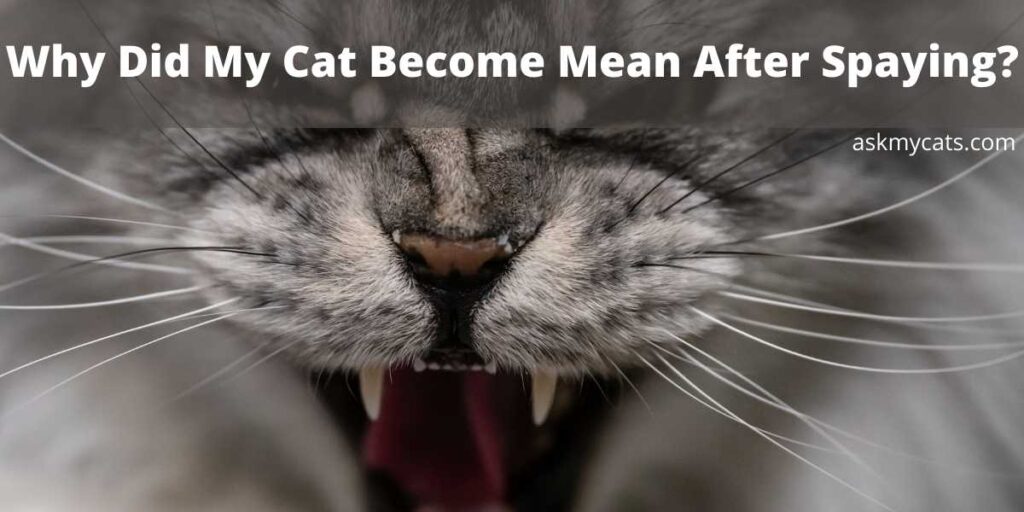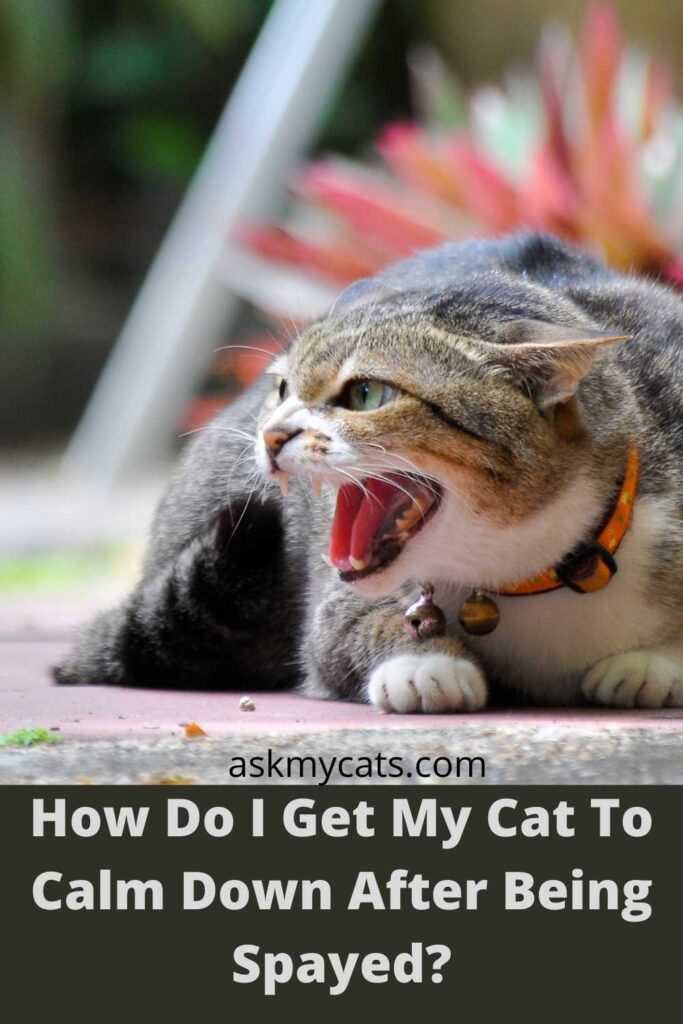So you have become a victim of your cat’s aggression? I am guessing that you are seeing this change in her behavior after she has been spayed.
Being a parent of three successfully operated cats, I do not doubt my eligibility to answer your questions.
The anesthetic that stays in your cat’s system following her surgery to neuter is typically what makes freshly spayed cats aggressive.
Depending on the quantity and type of medicine used, as well as how sensitive your cat is, these anesthetic side effects can last anywhere from a few hours to several days.
In this article, you’ll get to know if cats really get mean after being spayed to what to do to calm them down in that situation.
Check it out.


Give Your Cat the Perfect Day
Get the Free Ebook!
Do Cats Get Mean After Being Spayed?

Yes, it is normal for cats to become mean and aggressive after surgery.
Once the cat has been spayed, bear in mind that it could take up to a month for the cat to behave properly. Also, keep in mind that aggressive behavior in cats that have been spayed after 1-2 years of age may persist longer.
When cats are newly spayed and form and maintain hierarchies in households, there is some degree of hostility between the cats. These behaviors, which include head-swatting, hissing, growling, posturing, and even minor combat, are very typical.
In this case, it is best to let the process run its course so that a hierarchy can be established and upheld. Interfering with this process could encourage negative behaviors or make them worse.
Alternatively, you can use “time-outs” by locking your cat in a room without any food, treats, or toys. When putting your cat in time out, remain composed because cats are incredibly perceptive to negative and heightened emotions.
Keep the cats apart for ten to fifteen minutes. Repeat the procedure for 20–30 minutes if the hostile behavior reappears after the time-out. Increase the time between time-outs until the misconduct stops.
Note: Aggressive behavior is likely caused by separation anxiety if it tends to arise when you’re away from home. Assure that each cat has a cozy area with access to food, water, and litter.
Your cats should feel at ease and happy in this environment, which may be accomplished by offering a variety of toys or by turning on the television or radio. Don’t let it feel like a time-out, please! She has just been spayed.
Is It Normal For A Cat To Be Aggressive After Being Spayed?
It is not uncommon for a cat to act restless and aggressive post her spaying surgery.
You’ll need to watch out for seemingly innocuous changes in body language because cats may be quite subtle.
Her eyes will be fixed on someone or something, and her ears will move forward before flattening out and turning sideways. Cats that stare show signs of hostility.
Additionally, you want to confirm that there is a good amount of vertical space. Many people don’t consider how crucial it is for cats to be able to climb up onto cat trees or the tops of cabinets, but having that vertical space is crucial.
First of all, it will expand your home’s land area, which might resolve disagreements over who owns what portion of it.
Even if you live in a small flat, getting some cat shelves or a cat tree will benefit everyone because cats think in three dimensions.
You might need to reintroduce the cats, pheromone diffusers, and vertical territory, but don’t halt the redirected aggression.
Interesting Read: Why Is My Cat Acting Hyper After Neuter?
Why Is My Cat So Mean After Being Spayed?

One of the many causes of your freshly spayed cat’s aggressive behavior is surgical pain. Your cat recently underwent a full hysterectomy and significant abdominal surgery.
It’s possible that your cat’s aggression toward you is a result of some pain she’s going through. A young female cat is often not too cruel, but if your cat is older, the surgery may be having an even greater impact.
For a couple of weeks, she will be in a lot of pain. She may become aggressive toward your other pets as a result of feeling threatened by them due to this suffering.
It is a good idea to take the painkillers your doctor prescribed may also cause your pet to act strangely or become more aggressive.
If this is a problem, keep your neutered cat apart from other animals until her recuperation is more advanced.
Take her back to the clinic for a checkup and ask your veterinarian whether she needs to be given pain medication. Something is wrong when a person’s behavior changes abruptly.
You May Also Want To Know: Why Is My Spayed Female Cat Yowling? Is It In Pain?
How Long After Being Spayed Does A Cat Calm Down?
Once spayed, it could take the cat up to a month to behave properly following the procedure. Cats that are spayed after being between 12 and 24 months old may exhibit aggressive behavior for the rest of their lives.
Expect to witness a cat coming out of anesthesia that is sleepy and possibly a little confused.
Giving her a warm, quiet place to rest might be an excellent treatment because some cats become more aggressive when they are in pain and feel exposed.
Role Of Hormones
Your cat’s body will still contain mama cat hormones for days or weeks after the procedure if she was in heat, pregnant, or nursing when you had her spayed.
If she was in heat, her scent would still cause males to court her and females to defend their territory, both of which could result in conflicts.
If she was expecting, she would still be defending her area from your other pets and would still have the nesting instinct.
If she is nursing, she will continue to care for and defend her young until they are fully grown, and spaying will not have any effect on how aggressive she is when defending them.
How Do I Get My Cat To Calm Down After Being Spayed?

You can do the following things to make sure your cat doesn’t fall into trouble for her own actions:
1. Expect The Unexpected
Behavior changes that occur right away after a spay are primarily a result of the procedure itself.
For a day or two, they might feel tender, be a little less active, and have a little less hunger, but after two to three days, the cat should return to normal.
Make sure she has easy access to a litter box, water, and food. Your veterinarian will recommend the quantity, which is often half of her usual dish.
For the first several days, handle your cat gently as she may be tender around the incision.
2. Keep In Mind The Long Term Effects
The overall personality of your cat shouldn’t change. Unless we give housecats a rich, exciting environment with things to scratch, climb, and play with, they lead very sedentary lives.
She advises considering other circumstances that might be affecting the cat’s behavior at the same time as the spay operation, in addition to the cat’s lifestyle.
Changes in the home, trying a new cat diet, or simply becoming older could be the cause of these behaviors.
Cats can become less energetic as they age, and development can result in personality traits showing up more or calming down more.
3. Always Keep An Eye On Her
Keep a watch on the incision and look for any signs of infection, such as redness, swelling, or fluid leakage, which may necessitate further examination by the veterinarian.
After getting neutered, if your cat’s appetite wanes for longer than two days, it’s necessary to call your vet. She has a greater risk of developing an infection if she has been persistently licking her incision. This is why it’s crucial for our post-operative patients to wear the dreadful E-collar.
After this common procedure, cats usually bounce back within a day or two, but hostility may linger for longer.
Either this behavior stops quickly or you just have to put up with it as a part of her newly acquired personality.
Interesting Read: Do Cats Get Nicer After Being Spayed? Has Spay Affected My Cat’s Behavior?
Frequently Asked Questions
How do I tame my feral cat after she has been spayed?
Taming a spayed feral cat is difficult and not always successful. You’ll need a lot of love, patience, and goodies. Gaining its trust is crucial, so you must remain quiet and peaceful.
Sing or speak to them to entice them to approach you by holding up a toy. The fishing pool type would be the greatest. Don’t give him any reason to worry, and keep your hands covered.
In the hopes that the cat will ultimately come on your lap to eat it, try to approach it gradually while offering it canned food on a dish.
Keep in mind that it can take months.
Final Words
That’s all you had to know about spaying your queen and the changes in her behavior afterward. Do not worry if you are a new cat mom. This is normal.
Let us know in the comments section if your cat became aggressive or calmer after her surgery. What was your experience with her?

Yes…my cat is very aggressive towards me and this is the second day after spaying…worst of all she has lost her voice….before surgery she would “talk” to us all the time and now…..nothing…I am sad about this…it’s like she is a different cat……she is a little over 6 months old and is a Maine coon cat.
Thanks for sharing your experience.
I am sure, she will be back to her normal very soon.
Happy cat parenting